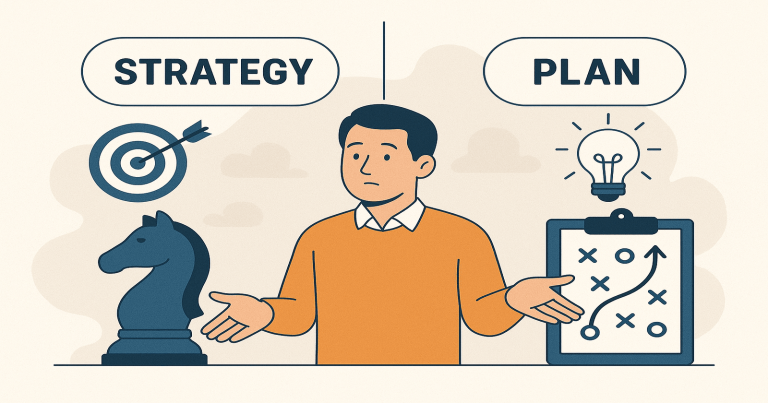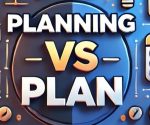Understanding the difference between strategy and plan is essential to achieve success in any field, be it business, education, or personal growth. These terms are often used interchangeably but have different meanings and purposes. A strategy gives the general direction toward the long-term goal, whereas a plan outlines the specific steps to be taken to achieve that goal. Both are critical for success; a clear strategy makes sense, and an implementable plan executes. This knowledge of what strategy is different from a plan enables you to align your activities more effectively toward achieving the desired outcome.
What is Strategy?
A strategy is a high-level approach or a blueprint for achieving a specific goal. It focuses on the “how” and “why” of an objective. Strategies are typically long-term, addressing the overall vision and priorities of an organisation or individual. They provide a clear direction, helping you navigate uncertainties and adapt to changing situations.
For example, a company aiming to expand globally might adopt a strategy of entering emerging markets. This strategy will guide decisions about which countries to target, what products to offer, and how to position the brand.
Key Characteristics of Strategy
A strategy is a plan designed to achieve specific goals and guide an organisation toward long-term success. It requires careful consideration of resources, flexibility, and decision-making to adapt to changing circumstances and future challenges.
- Goal-Oriented: A strategy focuses on achieving a specific goal, such as increasing market share or improving customer satisfaction.
- Long-Term Focus: Strategies are designed for long-term success, considering future trends and challenges.
- Flexibility: Strategies adapt to changing circumstances. For instance, a company may revise its strategy to respond to new competition.
- Resource Allocation: Strategies determine how resources like time, money, and personnel are distributed to achieve goals.
- Involves Decision-Making: Strategies require critical thinking and analysis to decide the best course of action.
What is Plan?
A plan is a detailed outline of the specific actions and steps needed to achieve a goal. It answers the “what,” “when,” and “who” aspects of a task. Plans are often short-term and focus on implementing strategies through clear and actionable steps.
For example, if a company’s strategy is to enter an emerging market, the plan might include tasks like conducting market research, registering the business, hiring local staff, and launching a marketing campaign.
Key Characteristics of Plan
A plan outlines the specific actions and steps needed to achieve broader goals. It provides clear details, focuses on short-term tasks, and ensures accountability for execution.
- Detail-Oriented: A plan provides specific details about what needs to be done, including timelines, budgets, and responsibilities.
- Short-Term Focus: Plans usually address immediate or near-future actions required to achieve broader objectives.
- Fixed Structure: Plans are typically rigid and follow a set structure to ensure consistency.
- Operational in Nature: Plans translate strategies into actionable tasks, bridging the gap between vision and execution.
- Accountability: Plans assign specific tasks to individuals or teams, ensuring accountability for completing them.
Difference Between Strategy and Plan
While strategies and plans work together to achieve goals, they have distinct characteristics and purposes. Understanding these differences helps organisations and individuals approach their objectives more effectively.

Definition
- Strategy: A strategy is a high-level approach designed to achieve a long-term goal. It outlines the vision and direction that the organisation aims to follow. For example, a company may have a strategy to become the market leader in five years.
- Plan: A plan consists of detailed steps that break down the strategy into smaller, actionable tasks. It specifies how to execute the strategy in the short term, such as launching a new product or expanding into a new market.
Focus
- Strategy: A strategy focuses on the long-term vision and direction of the organisation. It is about setting a broader goal and determining the path to reach that goal over time.
- Plan: A plan is focused on short-term actions and tasks. It details what needs to be done soon to move toward the larger strategy.
Flexibility
- Strategy: A strategy is flexible and can adapt to changing circumstances. As market conditions or business environments change, the strategy can be adjusted to align with new opportunities or challenges.
- Plan: A plan is more fixed and structured. While some adjustments can be made, it is usually focused on specific actions that need to be followed closely.
Level of Detail
- Strategy: A strategy is broad and conceptual, focusing on the bigger picture. It provides a general framework without going into specific actions or steps.
- Plan: A plan, however, is highly detailed and operational. It lays out specific tasks, resources, and timelines required to carry out the strategy.
Purpose
- Strategy: The purpose of a strategy is to provide direction and ensure that all actions align with the organisation’s long-term goals. It helps the company stay focused on its overall mission.
- Plan: The purpose of a plan is to guide execution by outlining the specific actions needed to achieve the strategy. It helps individuals and teams stay on track in the short term.
| Aspect | Strategy | Plan |
| Definition | High-level approach to achieving a goal | Detailed steps to implement the strategy |
| Focus | Long-term vision and direction | Short-term actions and tasks |
| Flexibility | Adaptable to changing circumstances | Fixed and structured |
| Level of Detail | Broad and conceptual | Specific and operational |
| Purpose | Provides direction | Guides execution |
Strategy vs Plan FAQs
What is the main difference between strategy and plan?
The main difference is that a strategy focuses on long-term goals and overall direction, while a plan outlines the specific steps to achieve those goals.
Can a plan exist without a strategy?
No, a plan requires a strategy to provide context and purpose. The strategy gives the plan its direction.
Is a strategy more flexible than a plan?
Yes, strategies are adaptable to changing situations, while plans are more rigid and focused on execution.
How do strategy and plan work together?
A strategy provides the vision and framework, while a plan translates that vision into actionable tasks. Both are necessary for achieving goals.
Why is understanding the difference between strategy and plan important?
Understanding the difference helps align efforts effectively, ensuring both long-term vision and short-term actions work together for success.


